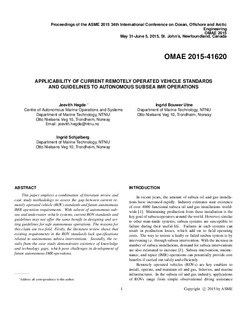| dc.contributor.author | Hegde, Jeevith | |
| dc.contributor.author | Utne, Ingrid Bouwer | |
| dc.contributor.author | Schjølberg, Ingrid | |
| dc.date.accessioned | 2018-04-09T11:51:47Z | |
| dc.date.available | 2018-04-09T11:51:47Z | |
| dc.date.created | 2016-01-05T17:22:12Z | |
| dc.date.issued | 2015 | |
| dc.identifier.isbn | 978-0-7918-5655-0 | |
| dc.identifier.uri | http://hdl.handle.net/11250/2493234 | |
| dc.description.abstract | This paper employs a combination of literature review and case study methodology to assess the gap between current remotely operated vehicle (ROV) standards and future autonomous IMR operation requirements. With advent of autonomous subsea and underwater vehicle systems, current ROV standards and guidelines may not offer the same benefit in designing and setting guidelines for safe autonomous operations. The reasons for this claim are two-fold. Firstly, the literature review shows that existing requirements in the ROV standards lack specifications related to autonomous subsea interventions. Secondly, the results from the case study demonstrates existence of knowledge and technology gaps, which pose challenges in development of future autonomous IMR operations. | nb_NO |
| dc.language.iso | eng | nb_NO |
| dc.publisher | American Society of Mechanical Engineers (ASME) | nb_NO |
| dc.relation.ispartof | Proceedings ASME 2015 34th International Conference on Ocean, Offshore and Arctic Engineering Volume 7: Ocean Engineering | |
| dc.title | Applicability of current remotely operated vehicle standards and guidelines to autonomous subsea IMR operations | nb_NO |
| dc.type | Chapter | nb_NO |
| dc.description.version | publishedVersion | nb_NO |
| dc.identifier.doi | 10.1115/OMAE2015-41620 | |
| dc.identifier.cristin | 1306506 | |
| dc.relation.project | Norges forskningsråd: 223254 | nb_NO |
| dc.relation.project | Norges forskningsråd: 234108 | nb_NO |
| dc.description.localcode | Copyright © 2015 by ASME | nb_NO |
| cristin.unitcode | 194,64,20,0 | |
| cristin.unitname | Institutt for marin teknikk | |
| cristin.ispublished | true | |
| cristin.fulltext | postprint | |
| cristin.qualitycode | 1 | |
